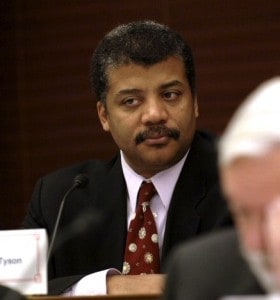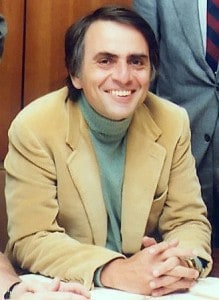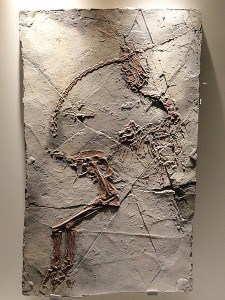I hope you had a chance to watch the first episode of the wonderful new science documentary series Cosmos: A Spacetime Odyssey that aired Sunday night. It is presented by the famed astrophysicist Neil deGrasse Tyson and is a follow-up to the 1980 television series Cosmos: A Personal Voyage, which was hosted by Carl Sagan. Dr. Tyson reminded us how we as human beings have come to possess such incredible knowledge about the nature of the Universe and the story of life itself. “This adventure is made possible by generations of searchers strictly adhering to a simple set of rules. Test ideas by experiment and observation. Build on those ideas that pass the test. Reject the ones that fail. Follow the evidence wherever it leads and question everything. Accept those terms and the Cosmos is yours.” In my recent columns on evolution, that is what I have been trying to say: we have to respect science. Unless something better can be invented, it is our best way of knowing about the nature of reality.
Why I care
The natural world is under siege. Humans have brought about what scientists are calling the sixth great extinction. Up to 50 percent of all living species are in danger of disappearing by the end of the century – primarily because of climate change. Anti-science attitudes and religious fundamentalism are part of the reason why addressing this crisis is so difficult.
It has always concerned me that creationists and other religious fundamentalists have rarely made protecting living Nature an important part of their teaching. As E.O. Wilson asks in his 2006 book “The Creation”, “do they believe that human-centered ethics and preparation for the afterlife are the only things that matter?… For those who believe this form of Christianity, the fate of ten million other life forms indeed does not matter.” What is even more disturbing, creationism now seems to have coupled itself with a rejection of climate science. The very idea of science as a way of knowing about the world is being challenged.
In his column of March 1, Jim Mason, a retired physicist, biblical creationist and speaker for Creation Ministries International, presented 12 questions “requiring answers with scientifically supported data.” I will address these questions. First, however, I would like to remind readers of the nature of this so-called “debate”.
• Creationism is the product of faith: Creationism proceeds from the account of the world as told in Genesis and expects the world to conform to that account. Consequently, the conclusion is already held to be true. Instead of citing evidence for why creationism is factual – and presenting this evidence in peer-reviewed scientific journals – creationists try to show why evolution isn’t. Science, on the other hand, doesn’t really “believe” anything in the way that religious faith does. Science looks at the totality of evidence and determines what the current most likely answer is that is consistent with that evidence. At some point, scientists pass a threshold where it would be (to paraphrase Stephen Gould) “perverse not to agree with the scientific evidence”. Like the theory of gravity and the germ theory of disease, the theory of evolution passed this threshold of evidence long ago. The objections raised against the theory of evolution do not come from scientists.
• How creationists argue: Because creationism can’t really offer competing scientific evidence, they often present what are known as ‘arguments from ignorance’, which are questions that science has not yet completely answered. The implication is that because something is not fully understood (i.e., there are gaps in our knowledge) God must be responsible for that phenomenon. We call these “God of the gaps” arguments. There are also ‘arguments from incredulity’, which imply that because something is difficult to understand or seemingly amazing – the evolution of the human eye, for example – only a supernatural force could have done it.
• The real problem: The problem creationists have with evolution is not that it challenges belief in God, because it doesn’t. Their problem is that evolution – like geology and astronomy – challenges the accuracy and authority of a literal interpretation of the Bible -especially the book of Genesis as an exact historical account. Yet, many religious people accept the theory of evolution and still maintain devoted religious lives.
The questions
The questions that Mason has posed all come from the Creation Ministries International website. You can find them at creation.com/question-evolution. If you wish to read a more detailed rebuttal than what I am providing, please go to rationalwiki.org/wiki/Question_Evolution Remember, however, that the answers to some of these questions involve complicated science and do not lend themselves to short answers. It is why scientists spend many years at university!
1. How did life originate? This question is irrelevant, because evolution does not claim to explain the origin of life. Abiogenesis, the natural process by which life arose from non-living matter, is not part of the theory of evolution. Still, science is getting closer and closer to answering this ‘God of the gaps” question.
2. How did DNA originate? DNA most likely evolved gradually from a simpler replicator; RNA is a probable candidate. What we have trouble grasping is the incredibly long period of time evolution has had to work with. Life has been evolving for 3.5 billion years. It would take you about 110 years to count to 3.5 billion, even if you counted day and night!
3. How could mutations create the huge volumes of information in the DNA of living things? There are many processes that increase genetic information. The most basic is that of gene duplication. Another mechanism is viral insertions – literally inserting new genetic material into a genome.
4. How did new biochemical pathways originate? This is basically an argument that biological structures and processes are too complex for a natural explanation to account for them. With time and proper mutations, completely new pathways do, in fact, originate.
5. How does evolution know living things weren’t designed? The claim that living things bear the hallmarks of design is, at best, a mere assertion. Complexity does not imply design; in fact, simplicity is a design goal in most designs. Historically, supernatural design has been attributed to lots of complicated things that we now know occur naturally, such as lightning, rainbows, and infectious diseases.
6. How did multi-cellular life originate? It was beneficial for single-celled organisms to work together. For instance, mitochondria, the “power sources” of cells, were once separate organisms. In a recent study by William Ratcliff and his colleagues at the University of Minnesota, single-celled yeast took less than 60 days to evolve into many-celled clusters that behaved as individuals.
7. How did sex originate? Sexual reproduction allows for evolution to occur at a much faster pace than asexual reproduction. Organisms that exchanged DNA were thus able to evolve out of situations that might have killed their asexual counterparts.
8. Why are countless millions of transitional fossils missing? They aren’t. Every fossil ever found is a link between older and newer forms. One of the most interesting is the Tiktaalik, a transitional fossil between fishes and amphibians. It is basically a fish with legs. Its “fins” have basic wrist bones and simple rays reminiscent of fingers. There are also transitional fossils between reptiles and birds, such as the feathered dinosaurs being dug up in China.
9. How did ‘living fossils’ remain unchanged? A living fossil – not a scientific term – is a species or group that has an extensive fossil record but also retains known living specimens, which show a similar appearance. It is quite possible, for example, that while living fossils have a similar exterior appearance, their internal biochemistry has changed dramatically.
10. How did blind chemistry create mind/intelligence, meaning, altruism and morality? Organisms develop from egg to full organism all the time through “blind” chemistry. Is that a problem? Also, evolution can be true regardless of the perceived moral implications. That being said, morality is actually part and parcel of evolution. It is linked to what happens when organisms live socially. Since humans are social animals and they benefit from interactions with others, natural selection – the mechanism by which evolution operates – has favoured behavior that allows us to get along better with others.
11. Where are the scientific breakthroughs due to evolution? Evolutionary concepts are applied to everything from understanding how diseases and pests evolve resistance to the drugs and pesticides to providing alternate explanations for physical and many cultural differences between different peoples. This allows us to debunk judgemental explanations that have led to conflict in the past.
12. Why is a fundamentally religious idea taught in science classes? Evolution merely describes part of nature. The fact that that part of nature is important to many people and is pursued with zeal does not make evolution a religion. If this was the case, even stamp collecting could be called a religion. Religions explain ultimate reality and the origin of life. Evolution does neither.
Even in 2014, denying the science of evolution – and climate change – represents a real danger to science literacy, science appreciation and to finding solutions to the environmental crisis. Let’s hope that the remaking of Carl Sagan’s Cosmos documentary will help to usher in a new respect for science and inspire us all in how amazing reality actually is. Don’t miss it next Sunday night!



